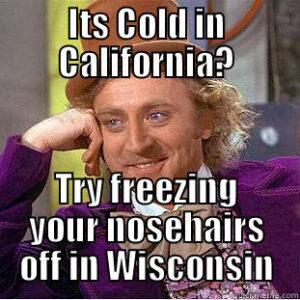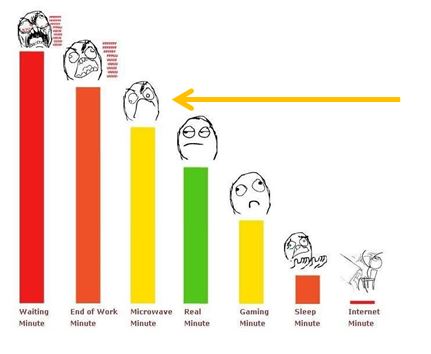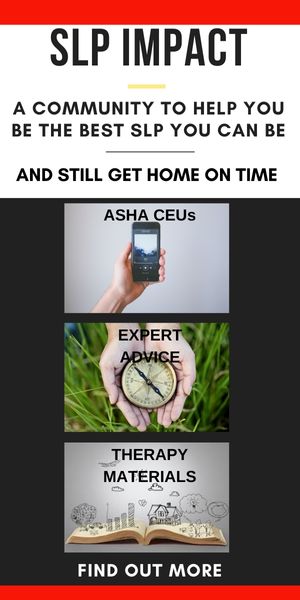A few weeks ago, we talked about graduate school programs for speech-language pathologists. This week, let’s get a bit more personal. Below is honest, valuable and personalized feedback about a few graduate programs across the nation. All of our experiences were different, and we wanted to share them with you.
The University of Wisconsin
Benefits:
- Staff encouraged working/volunteering outside of the UW setting AND provided opportunities for students (e.g., I worked on a project for a professor)
- Equal emphasis on academics and clinical setting
- Madison is a great city (e.g., music town, great recreational opportunities, healthy town with ample running opportunities)
Challenges:
- Weather–it was cold! My nose hairs froze for the first time, I learned how to properly wear a scarf and I am now able to drive on ice

- Far from home — essentially, I did not have challenges with the graduate school program. My challenges revolved around the location and being away from family and close friends.
Baylor University
Benefits:
- 4 semester and 3 semesters (fall, spring, summer) programs at Baylor University & 1 semester externship that can be completed in a variety of states/cities
- Rolling admissions: Good because you can apply for admissions any time of the year, and also good because all graduate students take the same classes together so all of your classes have people just beginning the program, people who have a little bit of experience, and people who are getting ready to go out on externship. It makes for a really nice mentor/mentee feeling throughout your experience at BU
- CSD departments are used to being tucked into dark corners of campuses. Baylor’s program is housed in a small 2-story building that feels like its own little world. It’s a great feeling for a graduate program because grad school can feel like your whole life when you’re in it. Baylor’s 1 small CSD building has 2 large classrooms, 12 therapy rooms, an observation room, and all the offices of its 20 AWESOME professors and supervisors whose doors are literally left open all day long. It’s also a 2 minute walk from the campus bookstore, the iconic Pat Neff Hall, the student union (coffee and food are SO important), and duh, the coolest part about Baylor – the Bill & Eva Williams Bear Habitat where you can go visit the 2 current bears (Joy & Lady – they’re sisters) whenever you need a brain-break.Challenges:
- It’s a private, Baptist University (which can be a benefit if you’re Baptist!). If you’re not used to being surrounded by this community, it can be an adjustment. If you’re willing to go in with an open mind and appreciate the community for the good that it does, it’s a great opportunity to build bridges. I’m not Christian, and I never felt any negative feelings being there. I learned a lot of good lessons about the importance of community and helping each other, even if I did have to bite my tongue sometimes.
- There’s not a PhD program. Although the professors there do their own research and graduate clinicians are welcome to participate, the graduate-level emphasis at Baylor is on clinical skills
- There’s only 1 microwave in the graduate lounge.
San Jose State University
Benefits:
- Grant for Bilingual students during my tenure there
- Wonderful mentor who led the grant
- Opportunity to complete a thesis about vocabulary development in bilingual preschool children
Challenges:
- Less emphasis on the adult population
- Away from family and close friends
Texas Christian University (TCU)
Benefits:
- Great supervision and clinical experiences (have early language classroom on site)
- Smaller program than most, so extra attention from professors and supervisors
- Because of small size of program, also easier to find clinical placements
- Brand new graduate workroom for grad students to work on reports, clinic work, study, collaborate (*wasn’t built when I was there, but I’ve been following their updates/photos on FB)
- Very good reputation within Texas
Challenges:
- Not a very large city, so often drove to Dallas for recreation (e.g., concerts and shows)
- Competitive and rigorous program–expectations are high, so opportunities to hold a job while in program may be restricted based on scholarship stipulations
The University of Texas at Austin
Benefits include:
- Multiple research opportunities and a required thesis or research project
- Emphasis on fluency (courses and clinic for stuttering and cluttering, local kid, teen, and adult chapters of the National Stuttering Association)
- Austin is a fantastic place to be – lots of students, young professionals, the weather is great, wonderful music and many festivals d) bilingualism emphasis – several courses as well as clinical opportunities to become a competent bilingual or multicultural SLP.
Challenges:
- Less coursework focus on autism and AAC devices (both assessment and intervention) but there are some great clinical settings that focus on this area
- Many people are moving to Austin. So, traffic has gotten more congested. So, at times, traveling to clinical settings took more time & gas than anticipated
SLPs, we would love to hear about your graduate school experiences.
Need more info?
Financial Aid Opportunities for Students with Disabilities can be found here:
Financial Aid for Students with Disabilities
http://www.bestcolleges.com/






Great article! Just wanted to add that University of North Texas has a great speech-pathology program as well and Denton is a cool “big town” and close enough to Dallas and Ft. Worth.
** Also, want to add that Ft. Worth IS a fairly big city with LOTS of recreational activities! (e.g. nightime entertainment (live music venues, museums, etc… 🙂 🙂
Evalis,
Thank you so much for sharing information about UNT, and I am glad you enjoyed the post. Personally, I feel that information about the demographics of a program can be obtained through website and “Top 10 lists”; however, the best info is sometimes found from personal experiences. And, I whole-heartedly agree–Fort Worth is a great place for recreational activities!
Again, thanks!
Phuong